Pregnant Trans Men Feel Alone And Mistreated By America's Health Care System
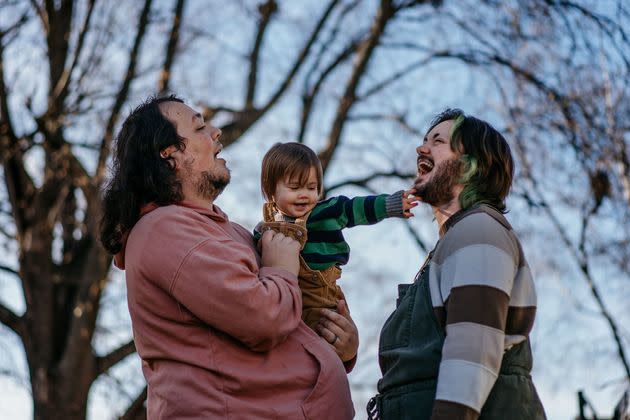
This article was published in partnership with The 19th, a newsroom reporting on gender, politics and policy.
Three days after Roe v. Wade was overturned, Sam Guidogave birth to his first child. His doctors, unsure of what was still legal, didn’t prescribe misoprostol — a drug used in medication abortions — to help with contractions.
That was another blow, another way in which Guido felt he wasn’t in control of his labor. Guido hadn’t wanted to give birth in a hospital at all — he was afraid to be there. As a transmasculine and nonbinary person, they have faced the same ignorance and discrimination in medical institutions that many trans people in the United States experience. But a home birth just wasn’t an option; health insurance wouldn’t cover that or midwife care, and Guido’s apartment was too small.
Instead, Guido enlisted chosen family and friends to advocate for them in the hospital. Having other trans voices in the room ensured that they were respected by hospital staff as they brought his daughter, T, into the world. Guido asked that The 19th only use his daughter’s first initial for privacy.
“They made sure everybody who came into the room knew that I was going to be ‘Papa,’ that I was T’s ‘Papa,’ and that the language that they used surrounding myself and my body was all appropriate,” he said.
T is now 17 months old. Guido is grateful for the small wonders of parenthood, like watching T learn to blow kisses and give high-fives, becoming her own person more every day. He and his partner, Joey, both grew up with siblings, and look at them as some of the most important relationships in their lives. They want T to have that kind of special connection. So for the past six months, Guido and Joey have been trying to conceive another child. It has been a beautiful and queer process — but not without struggle.
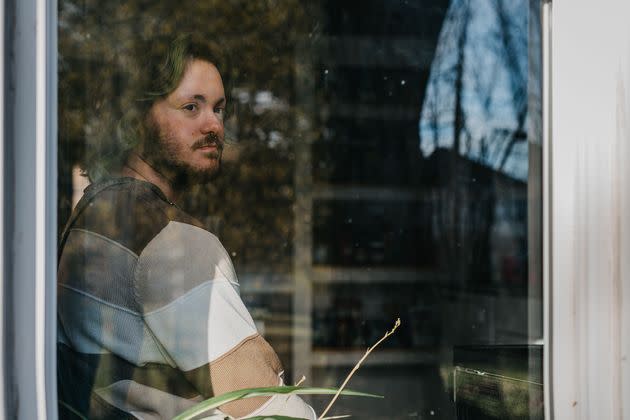
It’s taking longer than it took with T. Seeing one negative pregnancy test after the other has made Guido feel constantly like he’s doing something wrong. While trying to conceive, Guido has gone without testosterone, which many transmasculine people take for hormone replacement therapy. Without it, he struggles to regulate his emotions as his hormones fluctuate. His period has come back, which causes him significant gender dysphoria.
Yes, they want to get pregnant. But pregnancy means being vulnerable once morewithin the medical system. Prior to T’s birth, it took Guido a year and a half to finda safe and trans-affirming primary care doctor near where he lives in Janesville, Wisconsin.
It means risking harassment from strangers when going out in public while pregnant and looking too much like a man.
It means taking on the same emotional and financial turbulence as other couples who go through fertility treatments that, for whatever reason, aren’t working.
But trying for another pregnancy has also led Guido to discover new facets of their identity. As an asexual person, it has brought them closer to their partner as they both explore what intimacy looks like while trying to conceive.
Being a pregnant transmasculine person in the United States is full of these dualities — joy and pain. The 19th interviewed two transmasculine people who were elated to become new parents, but experienced isolation and discrimination in a health care system that assumes all pregnant people are women, and by a society that still views pregnant men as abnormal.
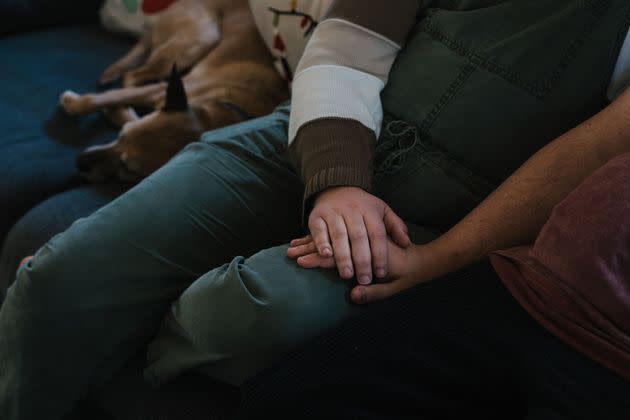
Guido’s last pregnancy showed them that being pregnant actually felt affirming to them — not dysphoric, as it does for some other transgender men. They have often felt like they have to justify those feelings.
“I was surprised at how little dysphoria I felt when it came to pregnancy. It felt very natural to me … in a way that didn’t challenge my gender identity in any way, shape or form,” he said.
Instead, Guido grappled with feeling invisible and isolated during his first pregnancy. Outside of his close circles, he couldn’t talk about this huge part of his life with other queer or trans people. In one queer postpartum group he tried to join, other trans people were uncomfortable hearing about his pregnancy, while some queer people pointedly said that pregnancy was an experience that only women had.
He didn’t see anyone else like himself.
“You pick up a pregnancy book, and it refers to you as ‘mama.’ You walk into pregnancy support groups, and it’s a group of cis women plus you, and everyone’s looking at you weird because you have a beard,” they said.
Those instances made Guido aware of how alone they were as a pregnant transgender person in rural Wisconsin.
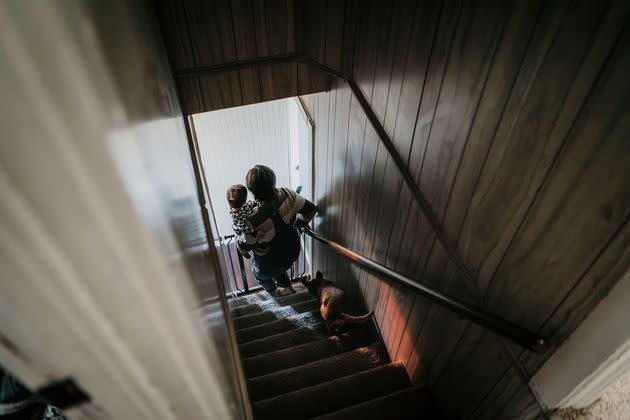
In rural areas, transgender people tend to have fewer resources and face higher risks being out than trans people in urban areas, according to a 2019 report from the Movement Advancement Project (MAP). With fewer accepting employers, doctors, housing options and nearby LGBTQ+ spaces, discrimination can have a more profound effect and make hostility harder to bear.
However, regardless of where trans people live in the United States, they often face discrimination within health care. That includes being denied insurance coverage for routine sexual or reproductive screenings that are still treated as women’s health issues like Pap smears and mammograms, according to the 2015 U.S. Transgender Survey. Others must teach their medical providers about trans people in order to receive proper care. Often they are asked invasive questions.
The country’s medical system is extremely ill-equipped to care for transmasculine people, said Kellan Baker, executive director and chief learning officer of D.C.-based LGBTQ+ health care provider Whitman-Walker. It gets even more difficult for pregnant transmasculine people, especially for those who experience gender dysphoria around pregnancy, to access good care, he said.
“People assume that trans men would never want to get pregnant because of dysphoria. Or people think that testosterone is birth control, which it isn’t,” Baker said.
Health care professionals often assume that trans pregnancies don’t happen — or if they do happen, that they are so rare that it doesn’t affect their practice. This leads to doctors who don’t know how to give people proper care, Baker said.
“When people don’t have the right tools to fully understand the health care needs of trans people, it can be deadly,” Baker said.
In a 2019 study in the New England Journal of Medicine, that risk is laid clear. A 32-year-old transgender manwent to the emergency room with severe abdominal pain, only to discover several hours later — to his surprise, and to the surprise of medical staff — that he was pregnant. At that point, there was no fetal heartbeat.
The patient was correctly identified as a man when admitted to the ER. But his treatment did not correspond to his actual physiology or needs. His symptoms weren’t treated as an urgent case of abdominal pain in pregnancy and his elevated blood pressure was assumed to be hypertension.
That same lack of knowledge among medical staff about trans people, and what kind of reproductive health care they need, also affected Kayden Coleman, a gay Black transgender man, during his first pregnancy in Philadelphia in 2013.
That ignorance among medical staff is part of why Coleman didn’t know he was pregnant for five months.He didn’t experience the same symptoms as most cisgender women would. He didn’t have breasts, so heightened tenderness was not a factor, and he didn’t have morning sickness. He only experienced fatigue, so his doctor assumed he was not pregnant.
“My rule of thumb is if you’re having sex with somebody with a penis that doesn’t detach, you can get pregnant. And you should be checking. And you cannot rely on your medical providers,” Coleman said. His own doctor at the time was a transgender man. It still didn’t occur to him that Coleman might be pregnant. “We’re kind of on our own out here,” he said.
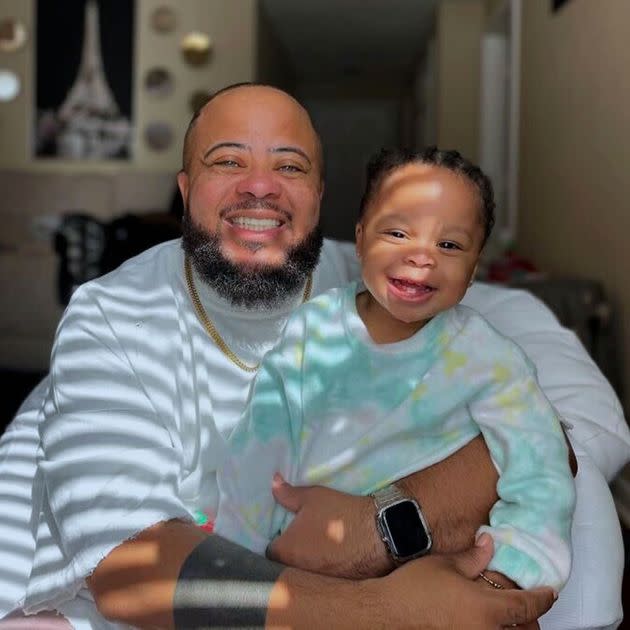
Once he started to receive care, Coleman enjoyed taking photos of his stomach and sharing updatesas his first pregnancy progressed. He didn’t feel any gender dysphoria — he wanted to be as visible as possible.
“Ten years ago, there was no representation of Black pregnancy for trans men,” he said. “I felt like we needed more of that. So I volunteered as tribute, I guess.”
Childbirth was traumatizing because of how Coleman was treated by medical staff. He wasn’t listened to, he said. After he was induced, medical staff misgendered him and ignored his requests for a C-section until he reached what he described as a mental breakdown. After his daughter Azaelia was born,he struggled with postpartum depression, anxiety and post-traumatic stress disorder.
It wasn’t until he met a nonbinary doula through a queer Philadelphia-based Facebook group that he felt truly helped and supported. They offered a depth of knowledge and warmth that went far beyond anything Coleman was offered in a doctor’s office, explaining what he was going through in a way that made sense.
“I couldn’t be left alone with my child without having a panic attack. So she helped me through that as well,” Coleman said. She took care of Azaelia so that Coleman and his former husband could rest, and talked him through the common experience of postpartum depression.
“Just her explaining all of the aspects, like the PTSD and all of that, helped tremendously for me to be able to talk myself off the ledge when I was feeling like I wanted to unalive myself,” he said.
The Centers for Disease Control and Prevention, which only tracks how many cisgender women face the issue, says that about 1 in 8 women with a recent live birth have experienced postpartum depression. There’s minimal comparabledata on the birthing experiences of trans people, and what little research has been done has largely excluded nonbinary people and trans women and has focused on white people’s experiences.
What’s known is that trans men often experience loneliness, anxiety and isolation during pregnancy, which makes trans-inclusive health care all the more important. Transgender men and women both face limited access to gender-affirming fertility preservation services, on top of erasure, stigma and discrimination within the reproductive health care system.
And considering the grave Black maternal mortality rate in the United States — Black women are at least three times more likely to die from a pregnancy-related cause compared to white women — more can be assumed: that Black transgender men, and Black nonbinary people, face even greater dangers when accessing reproductive health care.
When Coleman found out he was pregnant with his second daughter, Jurnee, New York City was shutting down due to the coronavirus.He had to navigate medical spaces without anybody else there to advocate for him due to heightened pandemic restrictions. He couldn’t bring a doula to medical appointments like he’d planned to. Those appointments were hostile, he said.
A receptionist at a perinatal office in Brooklyn told Coleman that he wasn’t supposed to be there — it was for women only. He had referral papers from his doctor so he was able to be seen, but he said the receptionist never apologized for trying to dismiss him. He said the ultrasound technicianat that same office laterrefused to use his correct pronouns or stop calling him the mother of his child.
It wasn’t a new experience for Coleman to be misgendered. But this was worse than what he had gone through before. He was stuck, COVID-19 limiting his options. He couldn’t just find a new perinatal office or a new place to get an ultrasound.
Coleman felt that much of his treatment throughout his second pregnancy — including medical personnel repeatedly asking him if he wanted an abortion even as he talked about how happy he was to have another child — was motivated more because of racism than because of transphobia.
“Them knowing I’m pregnant takes a backseat to their fear, or their microaggressions, towards Black men,” he said. “If I would have lashed out or lost my cool, now I’m the angry Black man, and who knows what could have happened.”
Those experiences robbed Coleman of moments of joy during his pregnancy that he can’t get back, he said. He remembers leaving an ultrasound appointment with Jurnee’s other dadfeeling hurt, angry and uncomfortable. And those moments kept piling on.
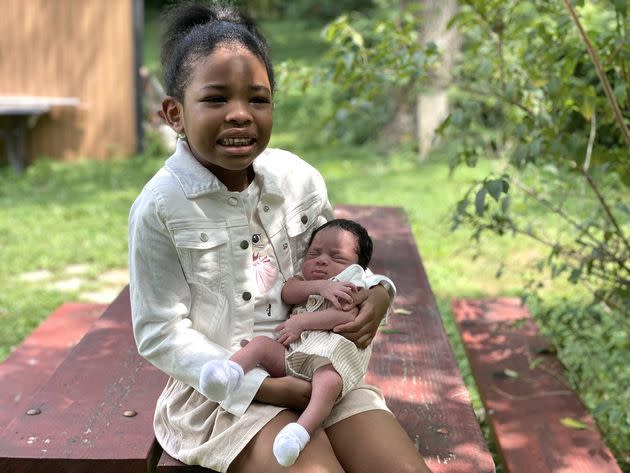
“As soon as you’d get one thing rectified, here’s another one. Eventually the office got it together, the ladies in there were even nice. But that was towards the end of my pregnancy,” he said. “The next move was to be in the hospital.Now I have a whole other staff that I have to deal with. And a whole other list of microaggressions that I have to deal with.”
Guido also struggled after T’s birth, experiencing a brief period of postpartum psychosis followed by depression that lasted for eight months. They started medication for their symptoms and saw a therapist weekly, feeling overwhelming guilt for not being as attentive of a parent as they wanted to be.
Their experiences with postpartum mental health issues underlined for them how vital it is for other transgender people to have access to birthing and postpartum spaces that are meant specifically for and led by trans people. Right now, even finding reproductive health care at institutions knowledgeable of trans people is difficult. And when Guido didn’t have trans-competent health care, he had to educate his own medical providers about his basic existence while trying to get help.
“My gender is intrinsically tied to this fertility journey and is a non-removable piece of it,” they said. “It’s already a very personal and difficult process currently, to conceive. I don’t really need additional factors making it harder.”
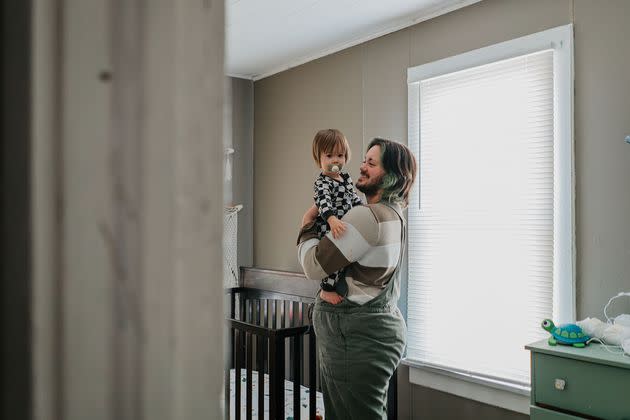
As Guido continues his journey to conceive again, he has found a new postpartum support group for queer and trans parents in Madison, roughly an hour’s drive from where he lives. The group meets every month. He joined them for the first time on a sunny, crisp Saturday in late October. The older kids — the 3- and 4-year-olds — played in the park as the adults swapped stories and ate packed lunches.
That meeting was an emotional moment for him. It was the first time he had ever interacted with another transgender parent who had gone through a pregnancy. Not only was his experience as a trans person being understood, but he wasn’t being doubted for his lack of gender dysphoria while pregnant. That was actually a shared experience between himself and the trans man that he met, who had brought his own family.
“It was just a relief to be like, ‘Oh, you get it. You’ve been there,’” he said. He’ll be back in the spring when meetings start again — when he expects to meet other trans parents like him.